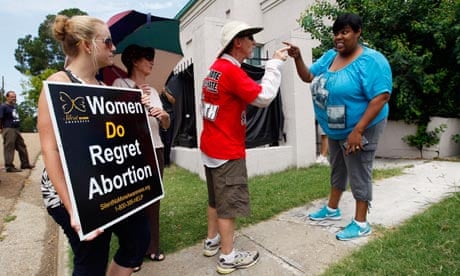In the searing mid-morning Mississippi heat, a middle-aged woman in dark sunglasses hovered outside the state's sole remaining abortion clinic, with sheafs of leaflets awaiting its clients. They contained graphic images of bloody and mangled foetuses and telephone numbers of alternative pro-life facilities.
Jackson Women's Health Organization, in the state capital, has been under siege since it first opened its doors in 1996. Its physicians and counsellors have been verbally abused, threatened, harassed and stalked. At one point they required police and FBI protection.
Yet they say they have never experienced so much pressure from the anti-abortion movement as they under are today. Not from lone, middle-aged protesters outside their door, but from the state's governor and lawmakers.
On Wednesday, a judge is due to deliver a ruling over a new state law, HB1390, which could close down the clinic, effectively banning abortion altogether in Mississippi. The law, signed by governor Phil Bryant, requires the facility's physicians to be board-certified obstetrician-gynecologists who have admitting privileges at a local hospital.
Documents filed on July 9 by the state in the court say that doctors with admitting privileges and the ob-gyn certification are "more likely to effectively manage patient complications by providing continuity of care and decrease the likelihood of medical errors" and that other states have the provisions.
The documents also cite health and safety concerns at the clinic and note that its owner, Diane Derzis, has been previously charged with violations at another clinic in Birmingham, Alabama. The violations include evidence that the clinic staff failed to respond to complaints of post-surgical complications. It also cites a lawsuit filed by an abortion doctor who sued Jackson Women's Health Organization alleging that Derizis jeopardised the heath and safety of patients by not using a doctor with admitting privileges when administering a drug which carries risk of haemorrhage and ectopic pregnancy.
The filing is being challenged by the clinic, which says that such complications are rare and claims that the law's sole aim is to shut it down. In a southern Bible belt state like Mississippi, the law is a catch-22: none of the local hospitals, many linked to churches, will grant admitting privileges and do not want to be associated with doctors who perform abortions.
The clinic, which has tried and failed to fulfil the new regulations, argues that no other, similar outpatient procedure is being subjected to the same rules.
Inside Jackson Women's Health Organization, Betty Thompson, the director, said she believes the climate is worse than the dark days of the radical pro-life movement, where the threat of violence was never far from the surface.
"It's worse because of those in high office like the governor speaking out" said Thompson, a softly spoken Mississippian in her 60s, dressed in a bright floral pant suit. "It's more restricted than ever. They got smart and stopped the violence. But what the state is doing is chipping away through the courts. So much is political."
Law HB1390 came into force at the beginning July, but a judge granted a last-minute temporary reprieve for the clinic. It is seeking an injunction against the law, and a hearing is scheduled for Wednesday.
'It's hard to have a reasonable discussion'
Mississippi is not alone in its attempts to limit access to abortions. Across conservatives states, there has been a concerted campaign by conservative, anti-abortion groups to shift the focus away from the treatment room to the court room in a bid to undo the constitutional right to abortion enshrined in the Roe v Wade supreme court decision in 1973.
Last year the number of bills to restrict abortion, from the defunding of Planned Parenthood to gestational limits, were the highest on record, according to the Guttmacher Insitute.
One of the most controversial in recent months was Virginia's attempt to pass a law requiring women seeking a termination to have a mandatory transvaginal ultrasound. Eleven states, including Mississippi, have similar laws in the pipeline, while a further 11 state's legislators have proposals to restrict medicated abortion, and 14 have introduced laws that seek to restrict abortion later in pregnancy – but prior to foetal viability.
Mississippi, the poorest state in the US, already has some of America's strictest laws on the procedure and an accordingly low abortion rate. But lawmakers are determined to bring it down to zero and are throwing their political muscle behind their goal.
Last November, residents rejected a "personhood" amendment to the state constitution that would have eliminated all abortions and some forms of contraception by defining life as beginning at the moment of fertilization. During the debate, Bryant, then the Republican candidate for governor, warned that if the amendment failed, "Satan wins".
"This is a battle of good and evil of biblical proportions," he said.
In April, he signed HB1390, another constitutional scheme with the same aim.
Such increasingly intense rhetoric against abortion from state leaders has silenced the pro-choice voice. One physician who spoke to the Guardian refused to be quoted because he has been falsely vilified as an abortion doctor after speaking out in the past.
"Even the common sense things don't get said" he said. "It's hard to have a reasonable discussion."
Doctors are ostracised for pro-choice beliefs. In April, the state's Republican lieutenant governor, Tate Reeves, blocked the appointment of Dr Carl Reddix, a Harvard and John Hopkins-trained doctor from the state's board of health. Reddix does not perform abortions but has admitting privileges and is the physician who the clinic would call if a woman in their care was rushed to hospital.

Critics argue that such overtly political decisions by leaders who frame the debate in moral terms clouds their ability to address the many problems Mississippi faces.
One example is a blind spot over the teenage birth rate, the highest in the country. Mississippi has 55 births per 1,000 teens aged 15 to 19 in 2010, 60% higher than the US average, according to the Centers for Disease Control and Prevention (CDC).
Yet until this year, there was no mandatory sex education in its schools. Even then it is limited. Following a new law, introduced in 2011 to tackle teen pregnancy, schools can choose from two curriculums, one emphasising abstinence, the other an "abstinence-plus" programme, which includes information about contraceptives and sexually transmitted diseases. Parents also have to opt their children into the programme, restricting the number of children who receive it.
Felicia Brown-Williams, regional director of Planned Parenthood Southeast, who has been advocating sex education in schools for years, said it was at least "a step in a positive direction".
Brown-Williams sees at first hand the effect Mississippi's poverty has on access to healthcare, from the patients who turn up at Planned Parenthood's small clinic in Hattiesburg.
She cites a list of problems where the state ranks among the worst in the country: the infant mortality rate, the maternity mortality rate, obesity and diabetes.
Brown-Williams said: "The disparity in the healthcare in this state is awful. Public transport is bad, and people do not have transportation. Pregnant women in particular are affected because if they do not have a car they do not have access to prenatal care."
She is angry at the focus on social issues by legislators.
"They have forgotten what they were elected to do. I don't understand why legislatures are looking to restrict healthcare in any way in a state where there's dismal access to healthcare of any kind."
She fears a return to backstreet abortions if Jackson Women's Health Organization is forced to close its doors, she said. The nearest clinic to Jackson outside the state is 180 miles away in New Orleans, too great a distance for women who, law dictates, would have to make two trips.
"The situation that we have already is of great concern to us." said Brown-Williams. "We fear that this is going to make women in a desperate situation resort to desperate measures."
A matter of race and economics
The kind of problems faced by the state's poor are what drew Dr Willie Parker back to the south to work for Jackson Women's Health Organization this summer.
Parker, an African-American from Birmingham, Alabama, lives in Washington, DC, where he practices, but also works in Philadelphia and Alabama. The former medical director at Planned Parenthood of Metropolitan Washington, Parker has only spent a few days at the clinic in Jackson but from what he has seen, he made the right decision.
Parker said the over-riding reason for women coming to the clinic to seek an abortion is economic.
"One lady at the clinic in her early 30s already had four or five children, and had had a child die from cancer a year earlier. She told me she couldn't afford another child, and emotionally she was not ready to raise another child."
Race is a striking element of the abortion debate, he said.
"The interaction between race and poverty means that the people who are being most vocal, who are setting the policy, are white, and the women who are being affected are women in poverty and women of colour."
"Those people are going to suffer even greater hardship if this clinic is closed."
When asked whether there is racism involved, Parker, who is one of the plaintiffs in the lawsuit against HB1390, said: "I don't want to speculate over what the motives of people are. Those who are focussed and narrow about abortion are driven by ideology, and the ones affected are the ones with the least political voice. It is unjust, and that's why we have to revisit it."
In Mississippi, 2,297 women had abortions in 2010, according to the state department of health. Most were unmarried, most were mothers and more than three-quarters were black. At the Jackson clinic, there are two typical clients: young mothers who cannot afford another child, and high school students who are not ready for motherhood.
"They don't know what they do when they limit women's knowledge in the schools, when they make it difficult for them to receive contraception, when they limit abortion for healthcare," said Thomson.
Advocating abstinence
Mississippi is one of several states with "conscience clauses" enabling pharmacists to refuse to give contraception, even when it is prescribed.
Ten minutes' drive across town from the Jackson clinic, Barbara Beaver runs the town's two Pro-Life Centers for Pregnancy Choices, offering free pregnancy tests as well as support and advice to pregnant women who want to continue with their pregnancies.
Beaver, the wife of a pastor who for years was a weekly presence outside the clinic, began her centers because she wanted to help the women she saw enter the clinic, she said. They talk to women about adoption or if they want to keep their babies, advise them on prenatal care. But they don't offer contraception, particularly not to unwed women.
"I understand this is controversial. But we can't teach people to sin safely" she said.
If the women are unmarried, CPC tries to persuade them that abstinence is the best path.
It is not a path followed by many high school students in the state. A CDC study last year found Mississippi students were much more sexually active than their peers. Some 58% of them reported having sex, compared to 47% in the US as a whole. Some 13% reported having sex for the first time at or under the age of 13, compared to 6.2% in the rest of the US.
Some lawyers say HB1390 will not survive, because it would place an "undue burden" on women seeking abortion, breaching her constitutional rights, and because its backers, while arguing that the law is necessary for health reasons, have gone on record to say that its purpose is to ban abortion here.
Philip Thomas, a personal injury attorney in Jackson who publishes a blog on Mississippi litigation, said the plaintiffs made a "very persuasive argument" to the judge.
"They have argued that these bills have made-up reasons to shut down an abortion clinic and they have focussed on similar cases in Mississippi where they are not valid and they have been struck down."
Matt Steffey, a professor of law at Mississippi college school of law, said: "The proponents of the law are going to have to show at the very least that this is not a unique burden on abortion clinics. But even then, that's not the end of the matter. They have to show it's necessary to women's health. If in fact most women don't have to go to hospital or those who do get the care they need, it's going to be very difficult to prove it is necessary. It will be interesting to see what the defendants come up with."


